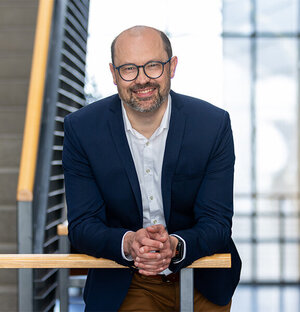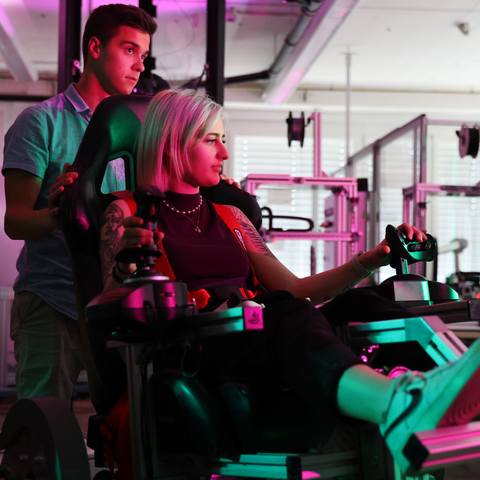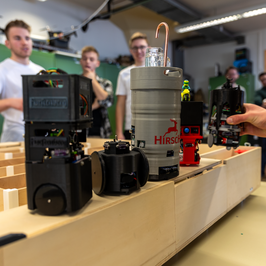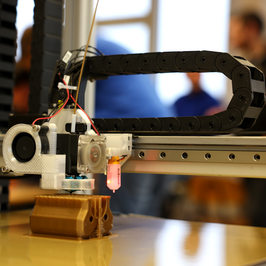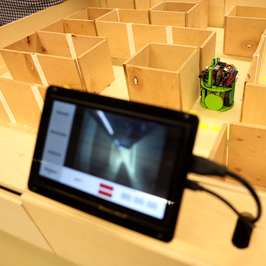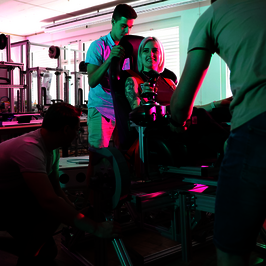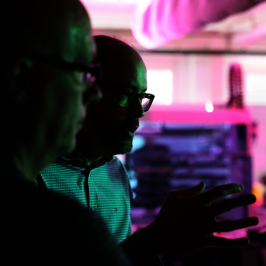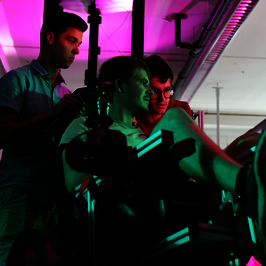Invent the future!
Do you want to advance the world with technical solutions and help shape the future? The Mechanical Engineering and Mechatronics degree programe provides you with the methods and tools to make this possible!
The degree programme focuses on*:
- Developing and building autonomous robots and intelligent drives
- Automating production processes
- Making machines smarter using artificial intelligence
- Contributing to the digitalisation of the industry of the future
- Developing and manufacturing high-tech products
*Teaching engineering basics such as reading and creating technical drawings, designing and building machines and much more.
Programme content and structure
What does the programme look like? On the Mechanical Engineering and Mechatronics degree programme, we teach you all the basics and skills you need to successfully solve technical problems in your professional life.
You don't have to commit to one subject area straight away. Our experience shows that many students only know which direction they want to take after the practical semester.
Thanks to our modern course structure, you can then tailor your studies to your interests. Whether design and production, automation and robotics or artificial intelligence, all doors are open to you.
Entry requirements
To study with us, you only need to provide proof of a university entrance qualification. You will learn everything you need for a successful career start with us during your studies. If your knowledge of math and physics is a little out of date or if you need support in other lectures, we offer special tutorials where you can clarify any questions directly with the lecturers or specially trained tutors.
MM specifics
If you want to help shape the future and are not afraid of a challenge, then studying mechanical engineering and mechatronics is just the thing for you!
The focus on mechatronics expands the course to include aspects of electrical engineering and computer science. This makes technical products intelligent and sustainable for all areas of work and life.
Engineers are technology specialists. In their day-to-day work, they are constantly on the lookout for improvements in plants and systems, work out solutions in teams and develop new products on the PC. They therefore have a special feel for solutions and can implement them constructively.
The practical orientation of the course prepares you to enter the profession directly.
What's covered
MM Study and Examination and Admission Regulations (SPO):
- Download file:General Bachelor SPO
- Download file:MM SPO
- Download file:Furtwangen University Admission and Matriculation Regulations
- Download file:HFU Bachelor Selection Procedure Regulations
Module descriptions:
Semester fees
Special features
Study Plus
Study and earn money at the same time. And not just a bachelor's degree, but a professional qualification at the same time? This is possible with our Study Plus cooperative study model . Unlike a cooperative degree programme, you combine our mechanical engineering and mechatronics degree with vocational training as an industrial mechanic. This takes a total of four and a half years and shortens the time compared to studying after vocational training by a whole year.
We have over 50 companies participating in the Study Plus model. Look out for the companies' job advertisements early on or contact the company of your choice directly.
Trainee programme during studies
The study-accompanying trainee programme offered by HFU together with strong partners from industry is aimed at students - from the first semester onwards. However, it is also possible to join the programme at a later stage of your studies. We offer various options for this.
To date, the programme has supported students with a total of several million euros. In more than 90% of the trainee contracts concluded to date, the trainees have been taken on directly by the company. Good prospects for both sides!
Your career prospects
Graduates of our degree programme have all doors open to them in their professional life. Our practical training prepares you to enter industry directly as an engineer. Common fields of activity are, for example:
- Design and development
- Production engineering
- Robotics
- Assembly processes
- Quality assurance
- Sensors and automation
- Medical technology
- Materials research and software and hardware development
- Customer support and sales
Would you like to do a master's after your bachelor's degree and then possibly a doctorate? This course is also a good basis for this.
Dates and events
Further dates and eventsUnfortunately, there are currently no events planned that we can display here. We have compiled an overview of all planned events in the event calendar.
Your key contacts
Your future is important to us. Contact us for advice.

Applied Materials Sciences (BSc) (AMB/WFT discontinued)
Mechanical Engineering and Mechatronics (BSc) (MM)
Mechatronics and Digital Production (BSc) (MDP)
Deputy Dean of Studies: Advanced Precision Engineering (MSc) (APE)
